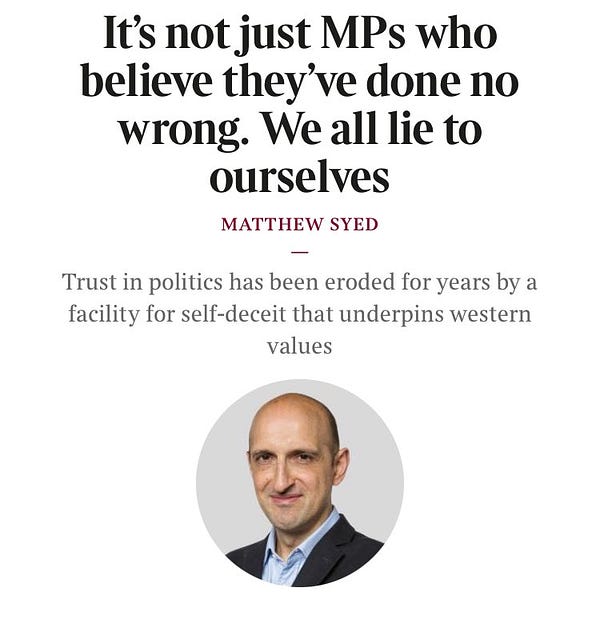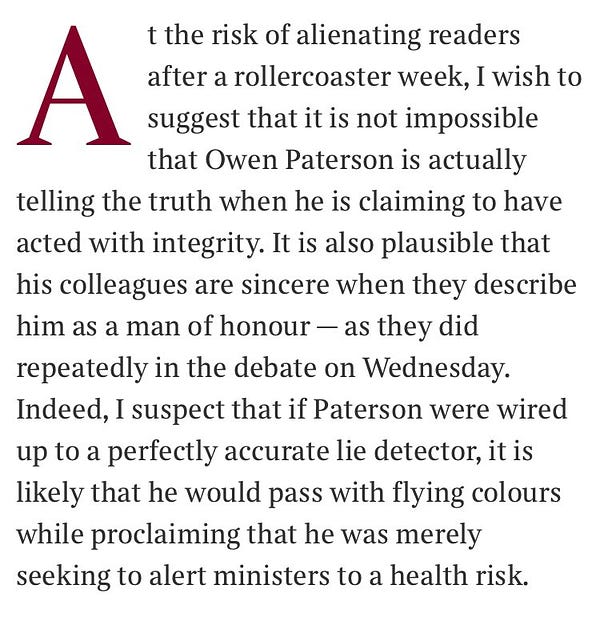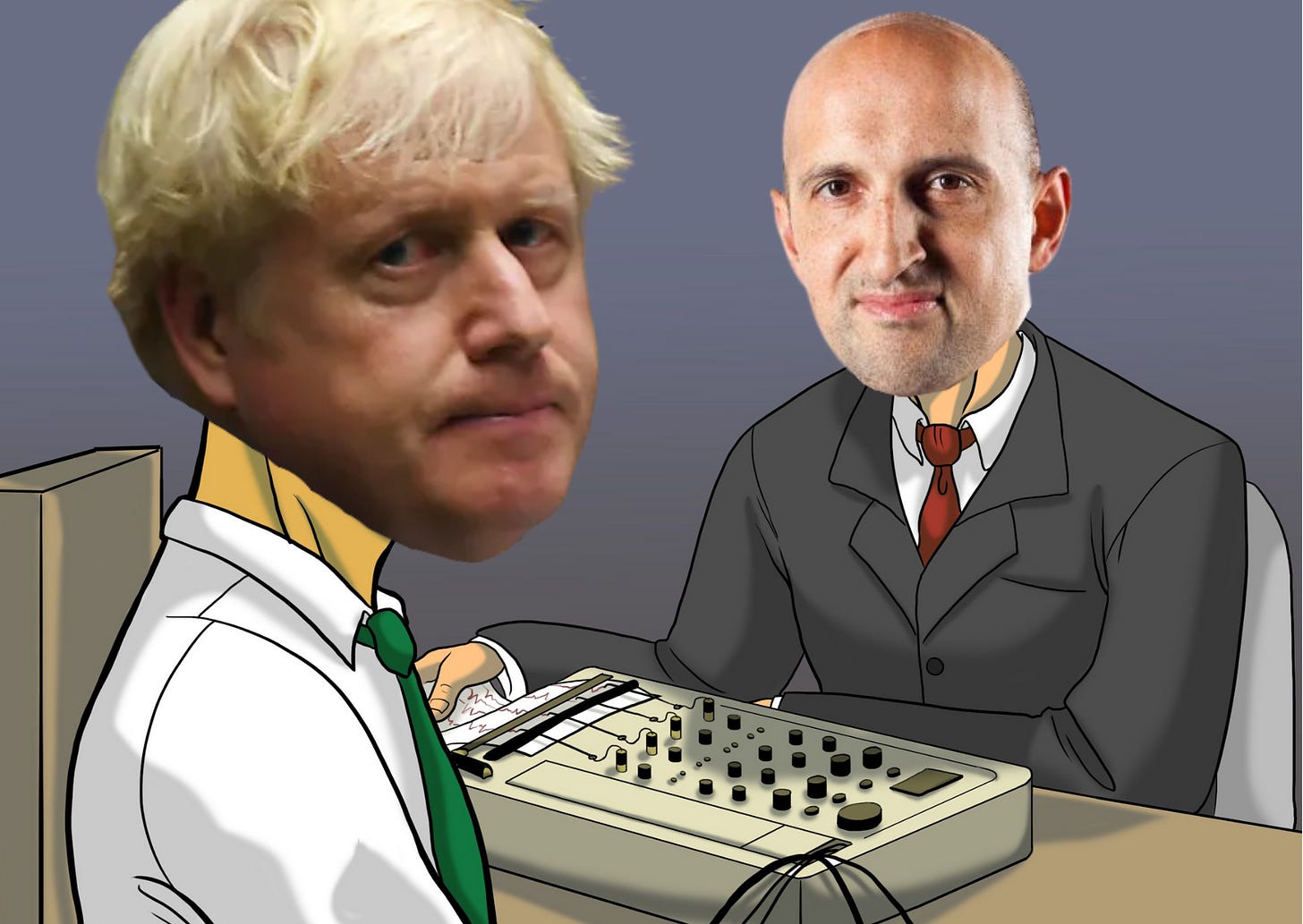The amoral of the story: “But aren’t we all a little bit corrupt?” the right-wing press asks as it moves again to turn scandals into gossip…
First we were asked to feel sorry for Owen Paterson, now we’re expected to consider corruption as just part of human nature.
Thought For The Day, Radio 4’s long-running religious propaganda slot, often features a variety of segue I like to think of as “… and isn’t that a little bit like Jesus?” logic1. It allows the priest, vicar, think-tank vampire, or Daily Telegraph writer who just happens to be a bow tie-obsessed Catholic presenting the slot, to link whatever is happening in that week’s news to Galilee’s top influencer.
Another aspect of “…a little bit like Jesus?” thinking is that it lets the speaker boil a complex topic into a simple soundbite while leaning on greater moral authority than they could possibly call on as an individual. A secular varient of this trick is often deployed by columnists who turn not to the good book but to a recently published book, generally something scientific that they may or may not actually have understood properly.
Former ping pong paddle-wielder turned Sunday Times columnist Matthew Syed is frequently guilty of the “grab a new science book that ‘proves’ what I wanted to say anyway” gambit. His latest column is a particulary egregious example, further muddying the waters around the Owen Paterson case in particular and parliamentary corruption in general by putting forward a line that might be described as “… and aren’t we all a little bit corrupt?” logic.



Beneath the headline It’s not just MPs who believe they’ve done no wrong. We all lie to ourselves and leaning so heavily on The Folly of Fools: The Logic of Deceit and Self-Deception in Human Life by Dr Robert Trivers that his copy must have deep elbow grooves in the cover, Syed writes:
At the risk of alienating readers after a rollercoaster week, I wish to suggest that it is not impossible that Owen Paterson is actually telling the truth when he is claiming to have acted with integrity. It is also plausible that his colleagues are sincere when they describe him as a man of honour — as they did repeatedly in the debate on Wednesday. Indeed, I suspect that if Paterson were wired up to a perfectly accurate lie detector, it is likely that he would pass with flying colours while proclaiming that he was merely seeking to alert ministers to a health risk.
If you infer from this that I am a Tory stooge, let me also say that I also think it plausible that Tony Blair was being sincere while proclaiming that there was nothing wrong with receiving millions from clients, including dictators, after leaving office.
Ignoring the howl of the neighbourhood dogs triggered by the use of the phrase “western values” in the lede (“Trust in politics has been eroded for years by a facility for self-deceit that underpins western values…”) the simple fact is that it doesn’t matter whether Paterson thought he was telling the truth. He was found to have exploited his position as an MP to lobby on behalf of companies which paid him £500,000 over a five-year-period.
Syed’s thesis that David Cameron, Tony Blair, and Boris Johnson alike are all experts at lying both to others and themselves is clearly correct. But his choice to focus on this question this week — even as the front page of the same paper points to the blatant cash for honours pipeline at the heart of the Tory Party — is instructive.
He is not only saying, “Well, this is what you voted for” but that these people are simply at the top of their game when it comes to self-deception and the rest of us exist somewhere in the league pyramid of liars. Syed continues:
Of course we all lie to ourselves to an extent. We tell ourselves that our jobs have more meaning than they really do, that we are more upstanding than we really are. This is probably healthy, up to a point. The danger is when self-deception becomes so exaggerated that we lose our moral bearings altogether, something that has brought democratic politics to its knees.
There are few jobs with less meaning than columnist — perhaps newsletter writer? — and it’s easy to accept Syed’s suggestion that we get the politicians we vote for and we, the electorate, are culpable for tolerating a rotten system. But what’s actually at work here is a member of the commentator class offering an excuse for the politicians. When he writes…
… the only way to restore probity in public life isn’t merely to target the likes of Johnson and Trump, for such chancers will simply re-emerge in new form. No, we have to deal with the deeper malaise of self-deception. And here it might help to reacquaint ourselves with the central moral insight of the Ancient Greeks — “To be honest with each other, we must first be honest with ourselves”.
… Syed shifts the blame from the specific (politicians like Paterson and Johnson) to the general. Dressing his arguments up in ‘ancient wisdom’ and references to the morals of ‘other’ cultures is just a means of hiding the cynicism beneath his guru wittering.

Syed’s fellow Sunday Times columnist, director of Margaret Thatcher’s think-tank, the Centre for Policy Studies, and 2019 Conservative Party manifesto co-author Robert Colville tweeted today:
Depressing how some people have gone from ‘we need greater civility in politics’ to ‘the Tories are irredeemably corrupt’ with barely a breath
Tories demand ‘civility’ when they are in power — it’s a synonym for “know your place” — but will happily write in the most ‘uncivil’ terms about “lefties” and the “wokerati” whose positions are endlessly caricatured as unpatriotic and outside of the acceptable bounds of thought and conduct.
It’s “uncivil” for Jeremy Clarkson to write a Sunday Times column — appearing in the same section as Colville’s today — that bears the headline If Greta and her pals really want to get results, they should try protesting in Tiananmen Square and features the 61-year-old father of three howling that a 18-year-old woman is an “annoying little bucket of ego” who “needs… a smacked bottom”.
Clarkson goes on to suggest that Thunberg is no good because she is not — in his view— as committed as Thich Quảng Đức, the monk who set himself on fire to protesting against the oppression of Buddhists by President Ngô Đình Diệm’s government2, or Emily Davison, the suffragette who fatally threw herself in front of the king’s horse at the Derby in 1913.
Of course, had Clarkson be present at those events, like some chuntering controversialist Zelig, he would have raged at the burning monk causing a traffic jam and cursed Davison for spoiling his day out at the races.

Perhaps in a bid to bulk out his word count — what with the pressure of having to still be objectionable for money to a weekly deadline in The Sunday Times — Clarkson quotes another of the paper’s columnists, self-confessed nearly nonce Rod Liddle, saying:
Rod Liddle calls [Thunberg] the “Swedish doom goblin” which is, of course, brilliant, but she’s worse than that. She’s a pest. A 4ft maypole around which the deranged and the weak and the unemployable can dance and chant and make a nuisance of themselves.
This is the paper for which Colville — crusader for civility — happily writes on a weekly basis. I wonder how he might feel in the future if a 61-year-old man used his national newspaper column to write a series of insults about one of his kids. Would he conclude that it conformed to his definition of “civility”?
Liddle — a man who accepted a caution for assaulting his pregnant parter and has such a long history of racist comments that he makes Roy Chubby Brown look like a UN cultural ambassador — uses his column to turn the fire onto the Labour Party, spraying shit in all directions like a malfunctioning muck spreader.
Seizing on the news about Claudia Webbe, the MP sentenced this week for harrassment and duly expelled by Labour, Liddle writes, under the headline The Tories will keep getting away with this sleaze. I mean, who’s going to vote for the other lot?, that:
Both our main parties are possessed of an epic complacency occasioned by the fact that in our two-party system the voter has a pretty grim choice: it is the hideously woke devil versus the deep blue sea of filth — and so it will be, eternally…
This is the man who, in the immortal words of Eamon Dunphy, “ran away and left his wife for a young one”, took the aforementioned caution — he claims because it was the quickest way for him to be released — and wrote in a column that is still up for all to read that he “could not remotely conceive of not trying to shag the kids.” Taking advice on morality and public probity from Rod Liddle is like asking Josef Fritzel to help renovate your basement.

Elsewhere in The Sunday Times, self-appointed arbiter of online morality and Lidl-brand Louis Theroux, Jon Ronson is interviewed to promote his new Radio 4 series Things Fell Apart. The premise is that Ronson floats above the issues he discusses, free from the political implications of topics like feminism and trans rights, and the journalist, Rosie Kinchen, ignores the glibness of Ronson’s Malcolm Gladwellesque conclusions (“The ferocity with which these battles are now fought is very much the result of the libertarian engineering culture that created the internet.”)
The most instructive moment in the profile comes when Ronson tells the story — and I use the word ‘story’ here carefully — of “hiking with a friend… who was positive he was going to get cancelled”:
I said, ‘Have you done anything?’ He said, ‘No’, but it was an example of the chilling effect… I’ve had to talk quite a few people down from the ledge.
Earlier in the piece, Kinchen relates that friends of Ronson call him “the imam of shame” and she dubs him — in a phrase that will no doubt make its way onto his next book jacket — the “prophet of digital behaviour”. All of this is related with a straight face and the suggestion that it’s politics-free, even as Ronson says, “The fact is that if you’re a white man, it’s more likely to happen.”
That’s a line that you’ll find in one form or another in most British newspapers on most days. It’s become an article of faith despite those who howl about being cancelled generally being people who maintain access to huge media platforms post-cancellation and, in fact, often get more opportunities after they claim to have been silenced.3


Ronson’s perception of online morality, the excuses offered by Syed for political lies and corruption, and the blinkers applied in the media to ignore the incivility and outright cruelty of columnists are all linked by a kind of “… isn’t that a little bit like Jesus?” logic. Scandals are broken up into gossip, fables, and a sort of philosophising about humanity in general.
I’ve predicted already that we are months, if not weeks, away from a newspaper supplement relaunch for Owen Paterson. We’ll also see that the ‘uproar’ about government sleaze will slip out of the headlines in the next few days, as the problem is generalised and diluted even more.
When the loudest media voices are moral vaccuums themselves, it doesn’t pay to put too much attention on how corrupt the politics they obsess over is. Far better to say the plague is in all our houses and hey, have you see the latest woke nonsense that’s really the problem?
A special edition for paid subscribers will be out tomorrow along with the usual edition. By the way, this guy…

… so do press the button below if you fancy, just so I know you exist:
I’m far from the first person to point this out. Billy Connolly talked about it in his An Audience With… show back in 1985, the year after I was born.
In a grim Clarksonesque touch, the columnist makes sure to note the car that Quảng Đức stepped from was an Austin A95.
I’m pretty sure there’s a direct correlation between being photoshopped with gaffer tape over your mouth and a huge uptick in earning power.




